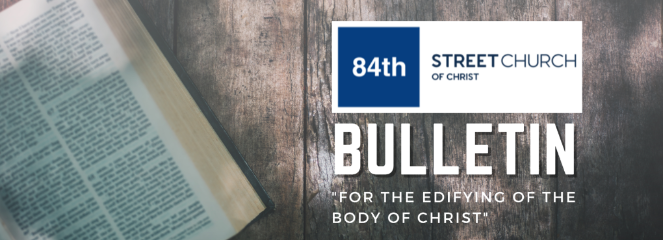Bulletin

Received, Not Achieved
Thursday, June 15, 2023
In the first four chapters of Paul’s first Corinthian letter, he dealt with sectarianism and pride amongst his readers. Some were saying, “’I am of Paul,’ or ‘I am of Apollos,’ or ‘I am of Cephas,’ or ‘I am of Christ’” (1 Corinthians 1:12). In doing so they were exalting themselves above others. This caused strife, and envy amongst the brethren. Paul saw this as an immediate threat to the integrity of the church he had “begotten…through the gospel” (4:15). In order to deal with this problem, Paul thought it necessary to explain the things misconstrued about the gospel message, and preachers.
Contributing to the party spirit in Corinth was the pagan love for philosophy, eloquence of speech, and wisdom. They mistook Paul, Apollos, and Cephas as new philosophers of the age. However, Paul called to their attention that the message was not philosophy, or mere human wisdom. He wrote, “Where is the wise? Where is the scribe? Where is the disputer of this age? Has not God made foolish the wisdom of this world?” (1:20). The message did not originate in any wise man, scribe, or disputer. Rather, the message of “Christ crucified…[is] the power of God and the wisdom of God” (1:23-24). Therefore, “no flesh should glory in His presence” (1:29). Those who were exalting themselves above others had no right to do so. The message preached did not come from Paul, Apollos, Cephas, or any other man! It came from God! Why should that cause them to glory? Rather, to God be the glory!
In order to further make his point, Paul described his part in the proclamation of the word. He wrote, “Who then is Paul, and who is Apollos, but ministers through whom you believed, as the Lord gave to each one? I planted, Apollos watered, but God gave the increase” (3:5-6). Paul was merely a servant of God, and a steward of His message. The power did not reside in him. It was foolish for the Corinthians to place Paul, and others, at the head of a party. They did not belong to Paul, they belonged to Christ!
 Those who pledged their allegiance to a certain party were “puffed up on behalf of one against the other” (4:6). Those who claimed to be “of Paul” thought themselves to be more valuable than the rest. Paul effectively put this attitude to the test. He wrote, “who makes you differ from another? And what do you have that you did not receive? Now if you did indeed receive it, why do you boast as if you had not received it?” (4:7). Paul did not deny the fact that there were some with abilities, spiritual gifts, etc. that differed from another. However, he did deny that it made them any more significant! The reason he gave is that they did not ACHIEVE these things, rather, they RECEIVED these things! Without God, any of their abilities would not be present. It is God who has given them the gifts, the message, and the abilities! They had no right to boast in themselves! Instead, they should be giving God the glory for the blessings He had bestowed upon them! For, “one and the same Spirit works all these things, distributing to each one individually as He wills” (12:11).
Those who pledged their allegiance to a certain party were “puffed up on behalf of one against the other” (4:6). Those who claimed to be “of Paul” thought themselves to be more valuable than the rest. Paul effectively put this attitude to the test. He wrote, “who makes you differ from another? And what do you have that you did not receive? Now if you did indeed receive it, why do you boast as if you had not received it?” (4:7). Paul did not deny the fact that there were some with abilities, spiritual gifts, etc. that differed from another. However, he did deny that it made them any more significant! The reason he gave is that they did not ACHIEVE these things, rather, they RECEIVED these things! Without God, any of their abilities would not be present. It is God who has given them the gifts, the message, and the abilities! They had no right to boast in themselves! Instead, they should be giving God the glory for the blessings He had bestowed upon them! For, “one and the same Spirit works all these things, distributing to each one individually as He wills” (12:11).
Pride is certainly a thorn in the side of most men. We tend to esteem ourselves above others. It would be prudent for each of us to examine the blessings in our lives, and determine where, or how, we got them. I would venture to say that we all have RECEIVED them and not ACHIEVED them. This concept does not belittle the idea of personal responsibility. Paul wrote to the church in Philippi to “work out your own salvation with fear and trembling” (Philippians 2:12). It is in fact our own salvation, and it is up to us to work it out. However, Paul continues, “for it is God who works in you both to will and to do for His good pleasure” (2:13). God has provided us with the necessities to work out our own salvation. HE has revealed unto us His will (cf. 1 Corinthians 2:16)! HE has provided us with strength (cf. Philippians 4:13)! HE has raised us from being dead in sin to walk in newness of life (cf. Romans 6:4; Colossians 2:12)! HE has done all of these things, and we must follow Him, and give HIM the glory (cf. Revelation 7:12)! Do not forget that we have RECEIVED, not ACHIEVED!

Christians: Timeless Optimists
Thursday, June 08, 2023
The earth rotates, revolves around the sun, and time continues. With the constant change in time there is a constant change in the events of life. These changes in life do not always work to our favor. In fact, the writer of Ecclesiastes explained, “I returned and saw under the sun that – The race is not to the swift, nor the battle to the strong, nor bread to the wise, nor riches to men of understanding, nor favor to men of skill; but time and chance happen to them all”(Ecclesiastes 9:11). Both good things and bad things happen to all men whether they deserve it or not. The majority of the populous dwell on the negative. They harbor frustration concerning past events so they can take them out of their mental filing cabinet when other instances arise. Not only do they remember the negatives in their life, but they expect them to reoccur. This is called pessimism.
Pessimism and time go hand in hand. Time denotes change, and change threatens misfortune. The pessimist rolls out of bed wondering what bad thing will happen to them that day. The sunrise is not a symbol of a fresh start, but an ominous indication of trouble, and hardship. They live their lives under an umbrella of negativity which deflects anything good that might fall their way. This way of life is not an inconvenient absolute that some unfortunately are born into. It is an intentional infliction upon the ignorant, and willfully ignorant, given by the father of lies (cf. John 8:44). Life is sacred because it is given by the Holy One for a purpose. It begins only with immense potential for good. The Devil would have us believe otherwise.
 The Holy Script is laced with optimism. In fact, the entire purpose of scripture is positive. Even the record of negative occurrences prove to have positive purposes – “For whatever things were written before were written for our learning, that we through the patience and comfort of the Scriptures might have hope” (Romans 15:4). The gospel is a message of health and wealth, but not in the sense that most desire. The health and wealth it offers is only possible because it is not plagued with the physical reality of time and chance. It cannot possibly offer supreme happiness in the abundance of earthly treasures and soundness of body because those cannot be universal absolutes for all citizens of mankind – “but time and chance happen to them all.” It offers that which can only be offered by the One who is not restricted by time – our timeless God (cf. 2 Peter 3:8) – “the Alpha and the Omega, the Beginning and the End” (Revelation 1:8).
The Holy Script is laced with optimism. In fact, the entire purpose of scripture is positive. Even the record of negative occurrences prove to have positive purposes – “For whatever things were written before were written for our learning, that we through the patience and comfort of the Scriptures might have hope” (Romans 15:4). The gospel is a message of health and wealth, but not in the sense that most desire. The health and wealth it offers is only possible because it is not plagued with the physical reality of time and chance. It cannot possibly offer supreme happiness in the abundance of earthly treasures and soundness of body because those cannot be universal absolutes for all citizens of mankind – “but time and chance happen to them all.” It offers that which can only be offered by the One who is not restricted by time – our timeless God (cf. 2 Peter 3:8) – “the Alpha and the Omega, the Beginning and the End” (Revelation 1:8).
The passage to timeless optimism is through Christ. He proclaimed, “I am the way, the truth, and the life. No one comes to the Father except through Me” (John 14:6). The gift that remains on the table is eternal life (cf. Romans 6:23). This offer is not influenced in any way by time and chance. The offer is firm, and without partiality. Once that which is offered is secured it cannot be taken away, for it is eternal (cf. Matthew 6:20). Thus optimism rules. Pessimism does not, and should not, rule in the life of a saint, for the prize can only be forfeited. There is no negative outcome independent from self-infliction – “[look] carefully lest anyone fall short of the grace of God; lest any root of bitterness springing up cause trouble, and by this many become defiled; lest there be any fornicator or profane person like Esau, who for one morsel of food sold his birthright” (Hebrews 12:15-16).
Christians can be described as timeless optimists because of the immutability of God’s counsel, “in which it is impossible for God to lie” (Hebrews 6:18). The earth rotates, revolves around the sun, time continues, but “Jesus Christ is the same yesterday, today, and forever” (Hebrews 13:8). Pessimism is not fit for a Christian. We are to “rejoice in the Lord always. Again I will say, rejoice” (Philippians 4:4)! Rather than allowing Satan to engulf our lives in uncertainty and negativity, find solace in this truth – “Who shall separate us from the love of Christ? Shall tribulation, or distress, or persecution, or famine, or nakedness, or peril, or sword? As it is written: ‘For Your sake we are killed all day long; we are accounted as sheep for the slaughter.’ Yet in all these things we are more than conquerors through Him who loved us. For I am persuaded that neither death nor life, nor angels nor principalities nor powers, nor things present nor things to come, nor height nor depth, nor any other created thing, shall be able to separate us from the love of God which is in Christ Jesus our Lord” (Romans 8:35-39).

Our Relationship with the Word of God
Thursday, June 01, 2023
The world is filled with differences among men – races, cultures, governments, values, etc. Despite all these there are shared things. Among these are the necessities of human life. No matter the race, culture, up-bringing, or values, each member of mankind has the dire need for water, food, and oxygen. Without these elements, among others, it is impossible to thrive. This is not a hidden truth. Even the simplest members of society groan with the pangs of hunger and thirst, knowing their need for such sustenance. No man would argue against these fundamental truths. However, despite the universal knowledge of these necessities there is one that is neglected by the majority of the human race.
 The word of God is an indispensable source of life and nourishment. It is a vital element in the welfare of mankind. While other facets of creation have only need of physical nourishment, mankind is in need of something more. We were created differently than any other. “And the Lord God formed man of the dust of the ground, and breathed into his nostrils the breath of life; and man became a living being” (Genesis 2:7). We, unlike animals, have something given by God that will ultimately return to Him in the end in contrast to everything else that will be destroyed with fire (cf. 2 Peter 3:10-13). “Then the dust will return to the earth as it was, and the spirit will return to God who gave it”(Ecclesiastes 12:7). This element of life is the difference between man and animal.
The word of God is an indispensable source of life and nourishment. It is a vital element in the welfare of mankind. While other facets of creation have only need of physical nourishment, mankind is in need of something more. We were created differently than any other. “And the Lord God formed man of the dust of the ground, and breathed into his nostrils the breath of life; and man became a living being” (Genesis 2:7). We, unlike animals, have something given by God that will ultimately return to Him in the end in contrast to everything else that will be destroyed with fire (cf. 2 Peter 3:10-13). “Then the dust will return to the earth as it was, and the spirit will return to God who gave it”(Ecclesiastes 12:7). This element of life is the difference between man and animal.
Most value their bodies above their soul. This is folly (cf. Mark 8:36-37). The apostle Paul put emphasis on the spiritual man when he informed Timothy, “bodily exercise profits a little, but godliness is profitable for all things, having promise of the life that now is and of that which is to come. This is a faithful saying and worthy of all acceptance” (1 Timothy 4:8-9). Those who spend hours upon hours planning, working, and worrying about physical health while neglecting their spiritual man live a superficial, irresponsible, and ignorant lifestyle. The effort to maintain physical aesthetics never fails to boast of vanity.
No matter the schemes and tactics the physical man will continue to deteriorate. There is no medicine, nutrition plan, workout plan, or beauty product that has the capability of renewing the body to its physical peak. This should not be worrisome to one who has a spiritual perspective. For the opposite can be said of the soul. Paul wrote, “Therefore we do not lose heart. Even though our outward man is perishing, yet the inward man is being renewed day by day” (2 Corinthians 4:16). The human body is designed to begin small and weak, yet with time it grows in stature and strength. However, on the other side of the peak it descends to an inability to function. The spiritual man is created for continual growth. The only possibility for a decline in spiritual health is self-negligence (cf. Hebrews 5:12-6:3). Sadly, this is true for the human majority.
Jesus said, “I am the living bread which came down from heaven. If anyone eats of this bread, he will live forever; and the bread that I shall give is My flesh, which I shall give for the life of the world” (John 6:51). He offers spiritual sustenance for all mankind. Yet most ignore and reject provision from the Son of God – “In Him was life, and the life was the light of men” (John 1:4), “And this is the condemnation, that the light has come into the world, and men loved darkness rather than light, because their deeds were evil” (John 3:19).
The word of God must be understood as a daily necessity. Without it we will starve. With it we will thrive. The spiritual man without the word of God is decrepit, emaciated, and vulnerable to the devices of our adversary. We must equip ourselves daily with the “sword of the Spirit, which is the word of God” (Ephesians 6:17). We would not purposefully neglect ourselves the sustenance of food and water. Why would we neglect ourselves the life-giving sustenance offered freely by our God? “Man shall not live by bread alone, but by every word that proceeds from the mouth of God.” (Matthew 4:4)

What Should I Speak?
Thursday, May 25, 2023
There is a vacancy within every man. A cavernous and frigid darkness once occupied with the Presence essential for life, yet emptied by free-will. A creation seen as good, dwelling with the Good (cf. Matthew 19:17), turned to the antithesis, betrayed by one “more cunning than any” (Genesis 3:1). He boasts liberty and offers pleasure while the reservation for “everlasting fire” (Matthew 25:41) awaits those who would lend him an ear. The putrid aroma ascending from his offer of eternal death is masked by the “deceitfulness of sin” (Hebrews 3:13). And so, the masses flock to his beckoning call not realizing they are “grasping for wind” (Ecclesiastes 2:11), only to fall short of their truly rewarding created purpose (cf. Ecclesiastes 12:13-14). Innocence vanishes and the life-giving Presence with it (cf. Isaiah 59:1-2), the separation resulting in a most devastating state of deprivation (cf. Romans 5:6).
 The void can be filled. Life can be restored by the One who possesses it within Himself (cf. John 11:25-26), the “lawless deeds” (Hebrews 8:12) being forgiven and remembered no more. This One’s counsel is immutable, thus His promises certain (cf. Hebrews 6:13-20). Yet they are conditional. Not upon nationality, rank, nor gender, but submission to that which He wills. Yet, “as the heavens are higher than the earth” (Isaiah 55:9) so His ways and thoughts transcend ours. They are essential to life, but not attainable through earthly wisdom (cf. 1 Corinthians 1:18-25). We must peer into His mind to discover “the depth of the riches both of [His] wisdom and knowledge” (Romans 11:33), but as no “man knows the things of man except the spirit of the man which is in him[,] even so no one knows the things of God except the Spirit of God” (1 Corinthians 2:11). But thanks be to God Who has given us “the Spirit…that we might know the things that have been freely given to us by [Him]” (1 Corinthians 2:12).
The void can be filled. Life can be restored by the One who possesses it within Himself (cf. John 11:25-26), the “lawless deeds” (Hebrews 8:12) being forgiven and remembered no more. This One’s counsel is immutable, thus His promises certain (cf. Hebrews 6:13-20). Yet they are conditional. Not upon nationality, rank, nor gender, but submission to that which He wills. Yet, “as the heavens are higher than the earth” (Isaiah 55:9) so His ways and thoughts transcend ours. They are essential to life, but not attainable through earthly wisdom (cf. 1 Corinthians 1:18-25). We must peer into His mind to discover “the depth of the riches both of [His] wisdom and knowledge” (Romans 11:33), but as no “man knows the things of man except the spirit of the man which is in him[,] even so no one knows the things of God except the Spirit of God” (1 Corinthians 2:11). But thanks be to God Who has given us “the Spirit…that we might know the things that have been freely given to us by [Him]” (1 Corinthians 2:12).
“’Whoever believes on Him will not be put to shame’…For ‘whoever calls on the name of the Lord shall be saved’”(Romans 10:11, 13). Therefore, in powerful simplicity salvation ensues. Yet, the beautiful message which saves the active hearer must be heard (cf. Romans 10:13-15). So commissioned by the Lord and aided by the promised Comforter (cf. John 14:25-26), disciples began to make disciples, and the pattern continued (cf. Matthew 28:18-20).
Twenty centuries accumulated atop that revolutionary Day of Pentecost (cf. Acts 2), men with void in their lives remain. The Deceiver continues his antagonistic mission wreaking havoc on creation purposed toward worshiping the God who created. And following the same pattern devised in eternity the adversary is combated by valiant followers convicted by the saving truth (cf. Jude 3). It is this truth only that freed men from the bonds of sin when the brave ambassadors of Christ walked the earth (cf. Romans 1:16). The hopeless message of the Sadducees could not offer victory over death (cf. Matthew 22:23-33). The vain attempt of Judaizers to marry salvation to the Mosaic Law could not free from sin (cf. Galatians 5:1-6). The arrogant doctrine of the Gnostics proved to be most foolish (cf. 1 John 2:18-23; 4:1-6). And any “good news” differing from the gospel “once for all delivered to the saints” (Jude 3) was unable to make one righteous (cf. Galatians 1:6-10).
Still today that mantle of proclamation must be assumed by any willing to stand in the gap. And once that “man of God” (2 Timothy 3:17) begins his journey he must ask the question, “What should I speak?” With this question he must remember the nature of the important war he wages (cf. Ephesians 6:12). His success cannot be found wielding carnal weapons (cf. 2 Corinthians 10:3-6). Instead he must equip himself with the “whole armor of God, that [he] may be able to stand against the wiles of the devil” (Ephesians 6:11), and grasping that living and powerful sword he must “wage the good warfare” (1 Timothy 1:18), speaking only “as the oracles of God” (1 Peter 4:11).

The Same Yesterday, Today, and Forever
Thursday, May 18, 2023
“Consistency, thou art a jewel.”
We crave consistency, but rarely get it. Even when we do it is understood as a relative concept with varying degrees. Some have differing views on what constitutes consistency, and even that varies regarding the respective context under consideration. Regardless, even when we think we find consistency we inevitably discover it is not entire. Everything fluctuates, especially the behavior of people.
 One of the many striking qualities of the eternal home promised to Christians is its consistency. Writing of the inheritance of those begotten of God, Peter describes it as “incorruptible and undefiled and that does not fade away” (1 Peter 1:4). One of the consistencies of this life is that no matter the quality or value of a physical object it will waste away given enough time. Even if it is of greater sustainability, one thing is for certain, its owner will inevitably waste away. James indicates this consistent truth in his exhortation for wealthy Christians to glory in their humiliation because they are going to fade away (cf. James 1:10-11). Conversely, “he who does the will of God abides forever” (1 John 2:17). This is because spiritual treasure amassed in heaven is of eternal consistency (cf. Matthew 6:19-21). It is an eternal, and therefore consistent place. In fact, to be there one is required to possess an eternal body that is not subject to change (cf. 1 Corinthians 15:50-57). Heaven is eternally and consistently good (cf. Revelation 7:16-17; 21:4; 22:1-5). This is true because it is God’s habitation, “with whom there is no variation or shadow of turning” (James 1:17).
One of the many striking qualities of the eternal home promised to Christians is its consistency. Writing of the inheritance of those begotten of God, Peter describes it as “incorruptible and undefiled and that does not fade away” (1 Peter 1:4). One of the consistencies of this life is that no matter the quality or value of a physical object it will waste away given enough time. Even if it is of greater sustainability, one thing is for certain, its owner will inevitably waste away. James indicates this consistent truth in his exhortation for wealthy Christians to glory in their humiliation because they are going to fade away (cf. James 1:10-11). Conversely, “he who does the will of God abides forever” (1 John 2:17). This is because spiritual treasure amassed in heaven is of eternal consistency (cf. Matthew 6:19-21). It is an eternal, and therefore consistent place. In fact, to be there one is required to possess an eternal body that is not subject to change (cf. 1 Corinthians 15:50-57). Heaven is eternally and consistently good (cf. Revelation 7:16-17; 21:4; 22:1-5). This is true because it is God’s habitation, “with whom there is no variation or shadow of turning” (James 1:17).
Though each day our salvation is nearer than when we first believed (cf. Romans 13:11), at the present we are subjected to futility in hope (cf. Romans 8:20). The need for reliability and consistency is apparent. The acceptance of this truth, and the following search for it is a part of the test of life. “Time is filled with swift transition,” but God designed it that way to encourage those in time to search for the Timeless One. Too often, men search for consistency and reliability within themselves, other people, or other things. These inevitably fail.
Incredibly, the way God planned to make Himself fully available for the finding was by sending His eternal Son into time. Jesus entered time and a body that was suitable to the circumstance. But while His flesh was like our own, the scriptures reveal with certainty that He continued to be the eternal God from the beginning (cf. John 1:1-5, 14). The offering of Himself for our sins was “through the eternal Spirit” (Hebrews 9:14) because it was God in the flesh Who died on that cross. This unprecedented truth was seen by His disciples as the only consistency there is. They witnessed “that eternal life which was with the Father” (1 John 1:2), and they have revealed Him to us. Jesus becomes our consistency within a universe of inconsistency. He is the only way to the eternal Father and His consistently good abode (cf. John 14:6).
Truly, there is nothing and no one that has merited our unwavering trust through an apparent consistency. There will always be change and decay in all around we see. Our constant prayer should be, “O Thou who changest not, abide with me!”
“Jesus Christ is the same yesterday, today, and forever.” (Hebrews 13:8)

